2024 NBA trade deadline guide: What each Eastern team could (or should) do

Welcome to HoopsHype’s fourth annual NBA Trade Deadline Guide!
With the deadline three weeks away, trade season has already begun, and with half of the regular season already played, it is increasingly clear which direction every NBA team is headed in. And for those for whom it remains unclear, the next month is an important window in which to decide.
Here is a breakdown of each Eastern franchise’s situation ahead of the deadline, some of their potentially available players, and whether we can expect each team to be active or not.
Atlanta Hawks
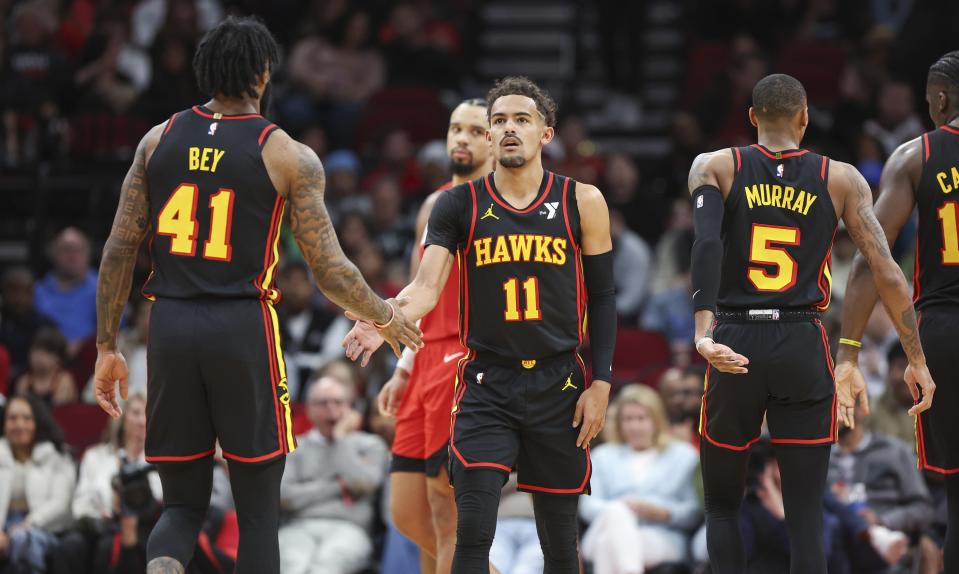
In something of a freefall, the struggling Hawks are likely to be one of the busiest teams on the trade market. And this is with good reason; they have a superstar guard coming up to his prime, not much else going well around him, defensive shortcomings, positional imbalances, and some veterans who could be moved on for a quick reload.
With this in mind, rumors that the Hawks are willing to trade everyone except Trae Young make sense. One player gaining particular traction is Dejounte Murray, expensively acquired to be Young’s backcourt partner 18 months ago yet not covering for his defensive inefficiencies as much as was hoped. With his $114 million extension about to kick in as he enters his prime years, the market for Murray is hotter now than it will ever be, at a time when his team needs to make a trade as much as they have ever done.
That hot market should give the Hawks a good degree of leverage, given the number of suitors that the young veteran All-Star will corral on the market. Murray is much desired, if not necessarily so in Atlanta. That said, because of the hefty price in draft capital paid to acquire him that will still be felt until 2027, a quality yield will also be required to not cap the franchise’s ceiling. (A replacement ball-handler will likely also need returning, to not create a different roster imbalance).
Beyond Murray, veterans Bogdan Bogdanovic, Clint Capela, and De’Andre Hunter should also be considered available, particularly Capela, for whom Onyeka Okongwu is readily available to take over full-time. The expiring $6,802,950 salary of the surplus Patty Mills can facilitate trades, as can the $23,019,560 remainder of the giant trade exception created through John Collins’ trade to Utah in the summer. Atlanta, then, should be having a busy month, as there is no value to be had in standing pat.
Boston Celtics
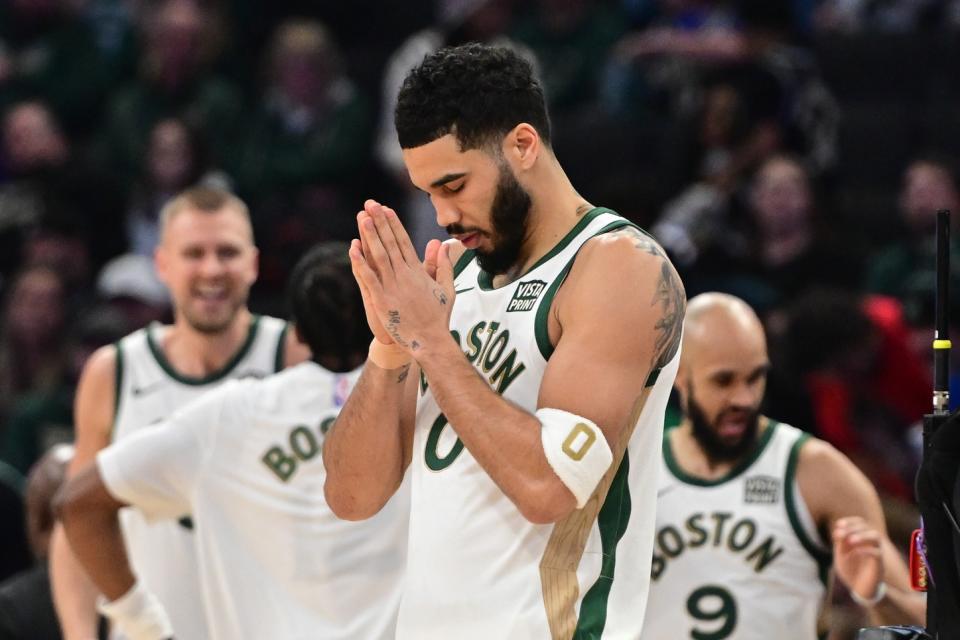
The Celtics are currently atop the East, and, after going through a fair degree of overhaul in the offseason with the acquisitions of Kristaps Porzingis and Jrue Holiday, they have little left in the way of draft capital and malleable salary to construct impactful details anyway. They are perhaps more likely to try and get reinforcements in the post-deadline buyout market than in trade.
That said, all that talent costs money. With over $185 million committed in 2023-24 payroll and even more next year, the Celtics will be luxury taxpayers this season for the second year in a row with the repeater tax looming, and while it is neither prudent nor realistic to try and shed the approximately $16 million in salary required to get under it in 2023-24, they may look to make some minor trades for non-rotation players to shed some penalties where they can.
Additionally, if the Celtics go the other way and add more payroll, they have a weapon on their side. The summer trade of Grant Williams to the Dallas Mavericks created a $6.2 million trade exception that remains untouched, which could be useful in Brad Stevens’ stated goal of adding to the wing rotation and improving their league-worst bench scoring.
To do this would require a level of financial commitment not before made to any Celtic team. Then again, with a title window very much open, now is the time.
Brooklyn Nets
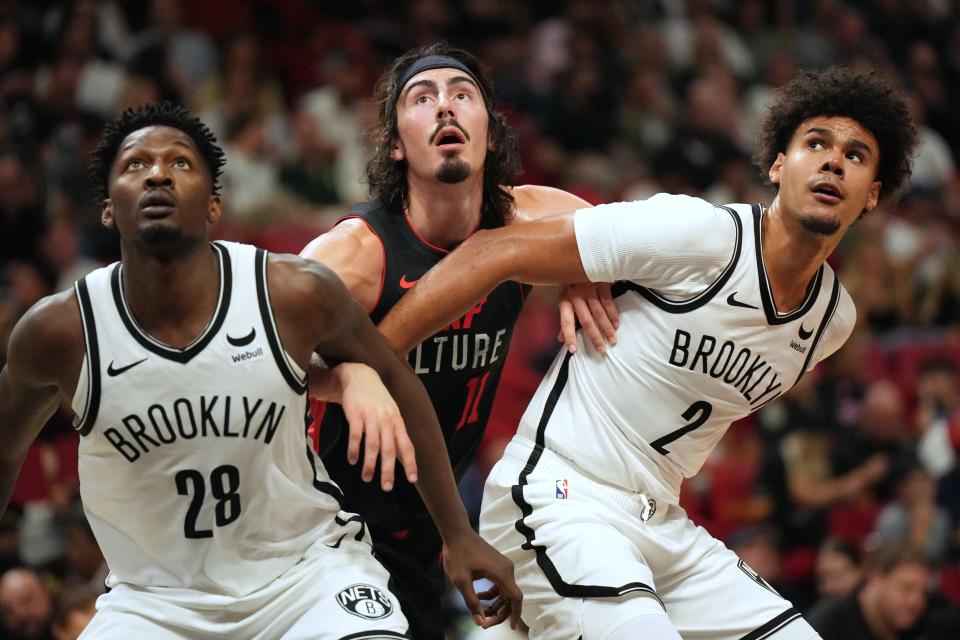
In the dreaded middle ground without being overly on the way up or down, the Nets can – and probably should – pick a direction at this deadline. With veterans like Dorian Finney-Smith, Spencer Dinwiddie and Royce O’Neale all realistically having better value on contenders, they should be considered very much available, and with his free agency approaching, Nic Claxton might be on the move too.
Financially, there is not too much pressure to act. Cameron Johnson and Mikal Bridges are tied into decent-enough salaries, and both Dinwiddie ($20,357,143) and O’Neale ($9,500,000) have expiring contracts. If Claxton stays and receives his nine-figure contract, the luxury tax (with repeater ramifications) may come into play down the road; however, Finney-Smith will be movable both now and in the summer, and resolution may yet be found with Simmons through a buyout, the stretch provision, or both. A $20-plus million contract for Claxton can be afforded with the current salary picture; he need only be moved if they have reason to believe he requires more.
The Nets purportedly want a Timofey Mozgov-esque haul for DFS, which may prove ambitious, yet it does seem to be a statement of the correct intent. Not dire enough to blow anything up yet too far off the pace to contend, the Nets have excellent trade resources (including two giant Traded Player Exceptions of $19,928,571 and $18,131,946) at their disposal, and plenty of room to get creative; in practice, though, their best value might come from being the “third” team that can facilitate the larger deals, a change from being in them themselves.
Charlotte Hornets
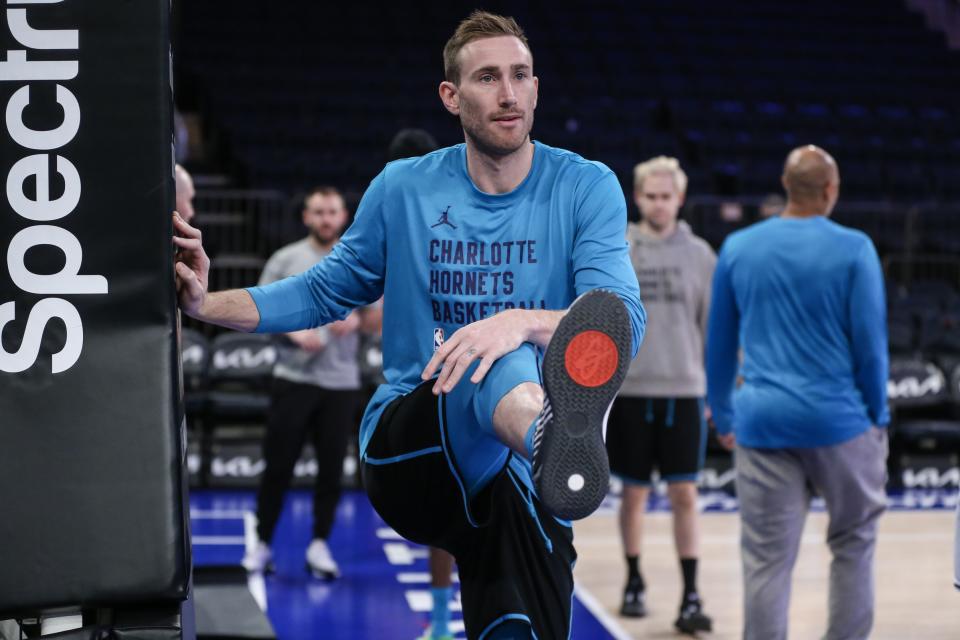
The Hornets are still not going anywhere, but Terry Rozier might be. Indeed, everyone except Brandon Miller, LaMelo Ball and Mark Williams might be. The Hornets are slow and static, cannot defend and cannot score, and the only saving grace of it all is the fact that the payroll that was so turgid for so long is freer these days.
However, even that is not as true as it might be. With Ball’s extension kicking in next summer, the savings offered by Gordon Hayward’s contract expiring are mitigated, and as he slides through the back nine of his career, Hayward’s value as a player is far short of the $31.5 million his contract is paying him. James Bouknight has not thrived in the NBA at all and has no trade value, no one wants Miles Bridges, and PJ Washington is no needle-mover.
Charlotte, ultimately, is in an awkward pincer movement of having an awful lot to do, but not an awful lot to do it with.
Chicago Bulls
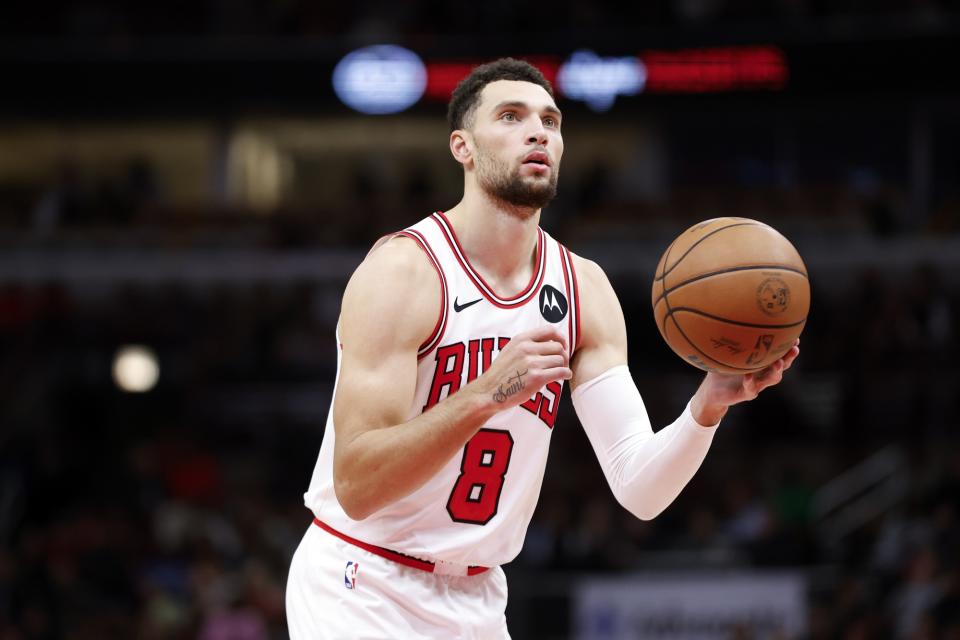
Chicago chose to essentially run it back over the summer, largely through necessity. The uncompetitive veteran team they had assembled was suitably expensive to not have the asset and cap flexibility to change it much, especially with the essentially dead cap number of Lonzo Ball clogging things up.
This status quo cannot continue forever, however, and the most obvious piece to be moved is Zach LaVine. In his prime and due a payday that the Bulls will not be inclined to give him the longest-tenured Bull should be considered very available. It seems very unlikely that a player who wants to leave, who has taken the team as far as he can go and who represents the best trade piece on a team with few trade pieces will make it beyond the deadline without being moved.
Similarly, although they re-signed Nikola Vucevic to a three-year, $60 million contract this past summer, it may have been less of a commitment to him as it was an extended sign-and-trade. Decent but declining, Vucevic’s slow feet and high price embody what is wrong with the current Bulls set-up, and given that DeMar DeRozan’s $28.6 million contract is expiring, it might be time to clear out all three and start again.
At that point, the Bulls might as well trade superstar role player Alex Caruso as well, while his contract still has a year and a half left on it, and neither Andre Drummond nor Jevon Carter has long-term value to the team either. After all that, the Bulls will not have much left in the chamber. But perhaps that is not so bad of an outcome.
Cleveland Cavaliers
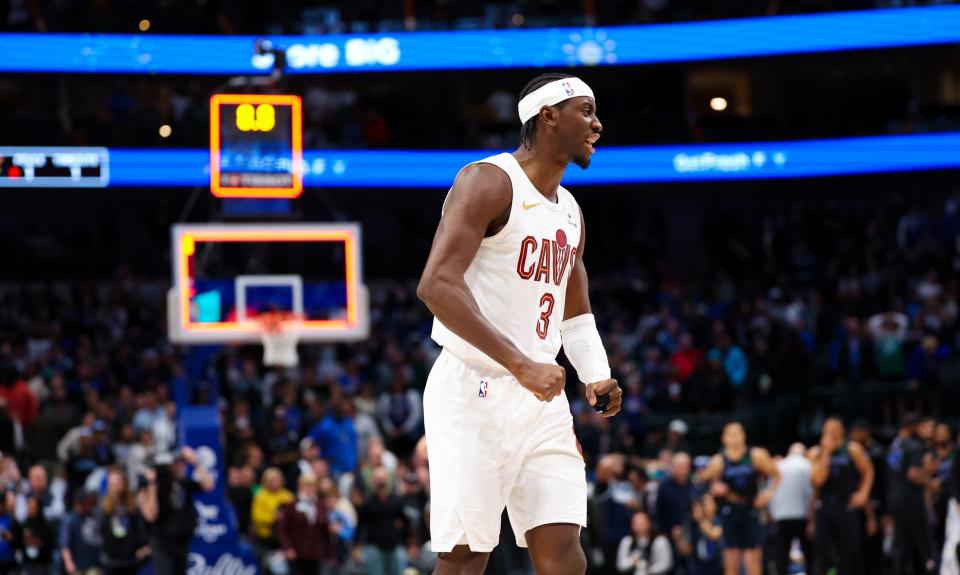
Having bought out Ricky Rubio, the Cavaliers find themselves approximately $3.2 million below the luxury tax, which may be enough room to make a small move for their playoff push. With only Isaac Okoro having an expiring contract of any tangible size, and Evan Mobley still needing to pay in the near future, the Cavaliers do not have the financial freedom to work the margins as they may wish to.
Nevertheless, persistent rumors linking them to forwards such as PJ Washington and Dorian Finney-Smith speak to the Cavaliers’ wishes to reinforce the frontcourt in a meaningful if not pivotal way. With no trade exceptions nor cap space to work with, the Cavaliers would have to salary match, using their mid-size contracts such as Caris LeVert, Max Strus, Okoro, Georges Niang and Dean Wade to get deals over the line.
Alternatively, though, a counter-narrative suggests they may have much higher aspirations. If Cleveland decides the core of their roster needs a shake-up, the fall guy becomes the external acquisition. Donovan Mitchell’s name has been floated in rumors, not because of anything he did wrong, but because he by default represents the expendable one should anyone need expending.
Sam Vecenie at The Athletic has tempered those rumors, and it seems unlikely that Mitchell will be moved at this deadline, something that would surely cause more problems than it would solve. Yet the Cavaliers have options and may be a surprisingly active time in the window’s final few hours.
Detroit Pistons
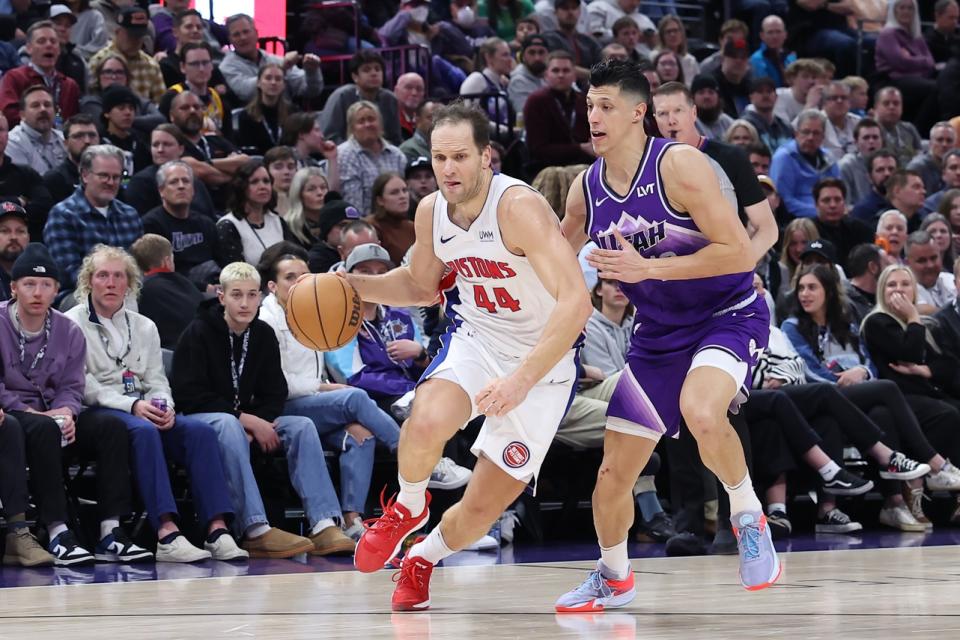
On the path to one of the worst seasons in NBA history, the Pistons have, quite literally, everything to improve on. They are so far adrift of the pack that there is nothing they can realistically target that will make much of a difference, and the persistent rumors attaching them to all the big names on the market are thus nonsensical. Their future, and their entire prognosis, is dependent on internal development and good draft choices. And it stands to reason that a team with only four wins in three months will not have many desirable players to cash in on.
Embodying this quagmire is the fact that, in the one move they have made so far, the Pistons were the ones giving up the draft capital. For a team at the bottom, they have comparatively little in the way of future draft assets to show for it.
A lot of focus is on how much cap room the Pistons will have next summer, yet this is a false allure. If the aim is to use it via trade, then giving up picks to get off contracts to create $64 million in cap space, just to mostly use that cap space to take on contracts in exchange for picks, is as sideways as it gets; if the aim is to use it via free agency, then good luck, because the star-caliber players will have better options and the lesser-caliber players will not change anything.
If nothing else, a trade of the 34-year-old Bojan Bogdanovic, while he can still average as-near-as-is 20 points per game, seems like a logical certainty. Yet is imperative for the Pistons as a franchise to learn from the Blake Griffin trade of the recent past.
Indiana Pacers
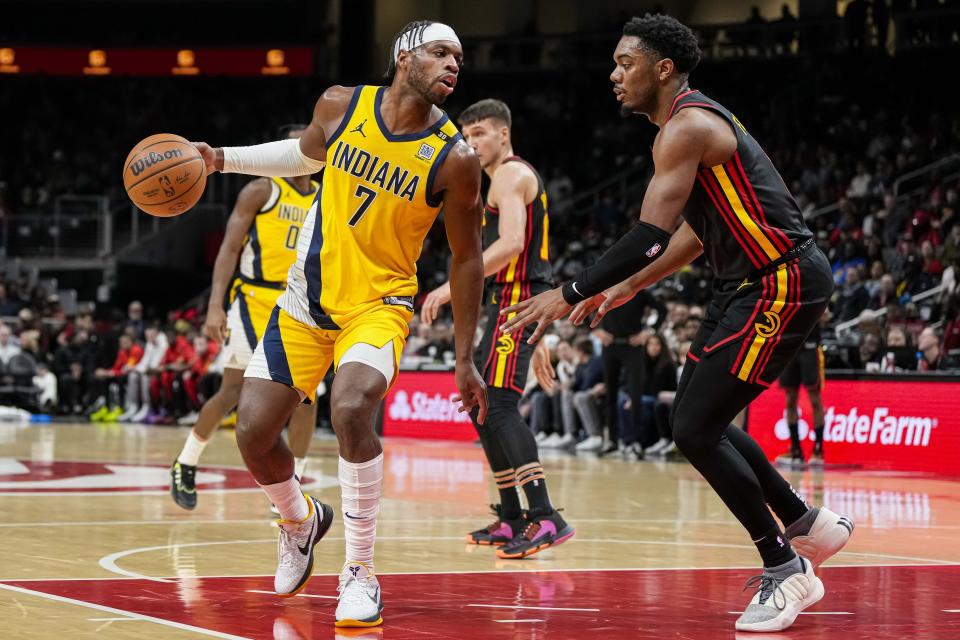
Buddy Hield is very unlikely to still be an Indiana Pacer next month. He has done a good job of rebuilding his once-sinking value since his acquisition from the Sacramento Kings in the Tyrese Haliburton/Domantas Sabonis swap, but now aged 31 and on an expiring $19,279,841 contract, the Pacers will want to cash in while they still can.
In the upcoming market, Indiana holds an enviable position. They have the league’s lowest 2023-24 payroll and nothing extraneous in future seasons, their superstar Tyrese Haliburton is already tied in, and their complimentary talents are either young, favorably paid, and often both. The Pacers are good and getting better, with assets to spend and nothing to dump, and so while it is not something the franchise does regularly, this could be a good opportunity for a big midseason trade to open a potential NBA Finals window early.
There is also a glaring deficiency in the current roster on the defensive end. Haliburton drives a spectacular offense, but the team’s potential will not be realized until their bottom-five defense is reinforced. It is for this reason that the Pacers were in on the talks for OG Anunoby before his eventual trade to New York. Perhaps Dejounte Murray will follow instead.
Miami Heat
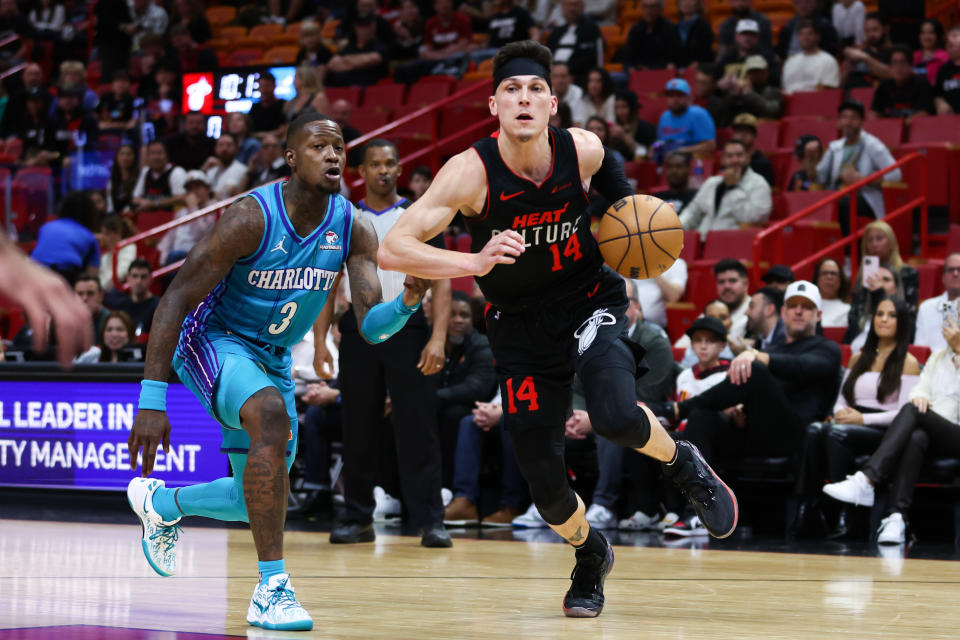
The Heat have a Top 10 payroll, and it is hard to point a finger at any of it and call it a problem. The resurgence of Duncan Robinson has paired with the immediate impact of Jaime Jaquez and the continued development of Caleb Martin to give the Heat the wing and frontcourt reinforcements they needed, and although the final throes of Kyle Lowry’s distinguished career do not see him produce $29 million’s worth of output on the court, he plays an important and consistent role that the Heat will not want to lose. Everything is going fairly well in Miami right now, a team that is not top of the contending pile, but which has never had to be favorites to be legitimate.
That said, the Heat also want to be involved in the mix for every available star and are prepared to be ruthless to get it. If there is a way that Lowry’s contract can form the foundation of a trade for another midseason star infusion, just as he was himself three seasons ago, the Heat will try and find it. Their draft capital is not the best and their financial position is not the most flexible, but if packages can be created around Tyler Herro for upgrades on Herro, they will do it.
Doing nothing would be defensive. It is not normally like the Miami Heat to rest on laurels and overly entrust youngsters. However, at this current time, the balance of young and old, expensive and cheap, veteran and youngster, offense and defense is quite good, and there is always the reassurance of knowing that Jimmy Butler still has levels he can tap into around May-time. The Heat will aim big; there is no reason to aim any lower.
Milwaukee Bucks
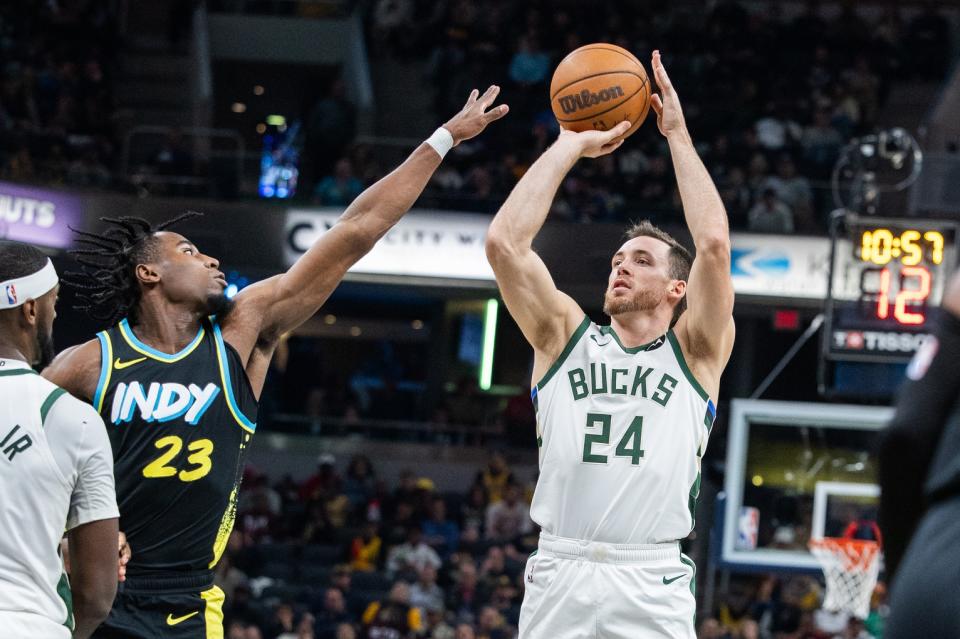
The Bucks tend to be significant players in the post-deadline buyout market, and, having taken their big shot with the offseason acquisition of Damian Lillard, they seem unlikely to do anything substantial again. If nothing else, the logistics make it incredibly difficult; the Bucks only have six players earning above the 10-year veteran’s minimum, at least two of which are completely untradeable, and all six of which are doing what they are there to do.
In an ideal world, perhaps they would be able to acquire a veteran wing defender to provide cover for the young pairing of Andre Jackson Jr and MarJon Beauchamp, as well as an extra hand in the backcourt. Much as the Bucks under Adrian Griffin can score, they are giving up a worrying amount of points on the regular, and greater versatility in their personnel on that end would help. To do so via the trade market, though, when so few contracts are expendable and so many draft picks have already gone out, will be very difficult. The Bucks will likely try to be buyers but may need to settle for standing pat with Pat Connaughton.
New York Knicks

The Knicks are in a position where they both can and want to be players in the market. They have already made one move, picking up OG Anunoby from the Toronto Raptors in exchange for RJ Barrett and Immanuel Quickley, and they still have the combination of Evan Fournier’s contract and a plethora of other team’s future draft picks (complicated protections notwithstanding) to be able to take another chance in the market.
The deal with Toronto freed New York from the sizeable contract they had given Barrett, but losing Quickley was the price of doing so, and it was a big price to pay. In a vacuum, it was a trade that hurt the team. However, the Knicks have a month to ensure that it was not in a vacuum and to utilize this new-found financial wiggle room to bolster their lineup and make a run for the NBA Finals. It would be a surprise if they did not do so, and trading for the Hield types is not the right level to aim for. Things are thus set up for the Knicks to both want and need to make a LaVine-caliber deal.
Orlando Magic
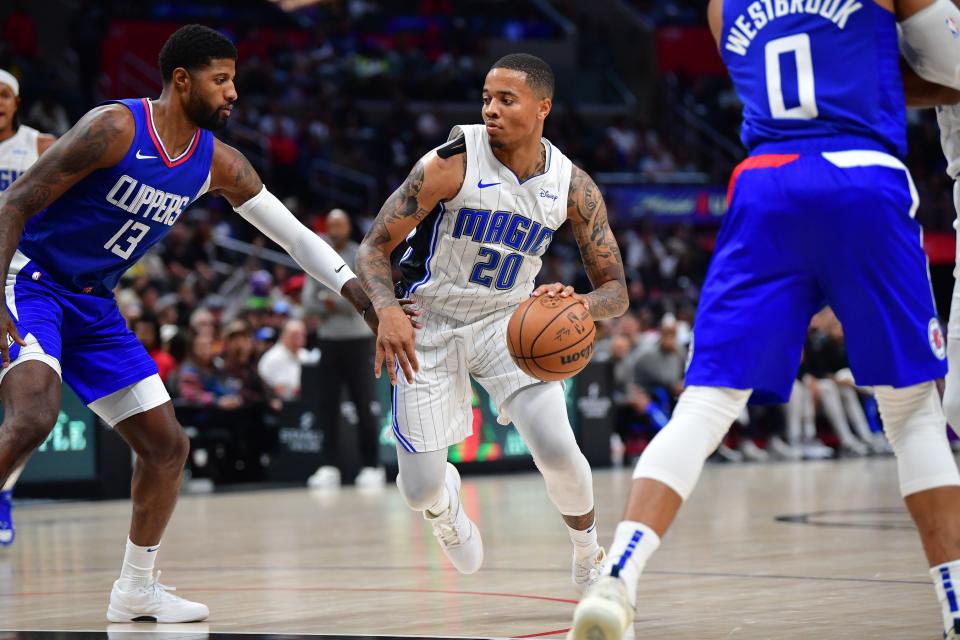
Heading back to the playoffs, the young Magic roster could be significant buyers for the first time in a while.
Rumors abound that Markelle Fultz and Wendell Carter Jr are already on the market. Perhaps seeking a more half-court point guard to consolidate their numerous frontcourt talents, the oft-injured Fultz becomes the odd man out, especially given that his $17 million contract is expiring. So too is the $13 million contract of veteran Gary Harris, who fulfills a role for the team, but only in a role that could be replicated for less elsewhere.
Carter has found himself in a bit of a squeeze, hampered by injuries that have curtailed his steady growth over the years, and watching as Goga Bitadze has excelled in his place. Still only 24 and with a cheap declining contract that will soon cost less than a full MLE, he may represent a tremendous opportunity to buy relatively low on the market, a risk that the Magic can afford to take given the timing of their projection and the more immediate needs elsewhere.
A package of Carter and Fultz – Carter as the prize, Fultz as the vehicle – is a great starting point for constructing the kind of sizeable market-making deals that the Magic have not been able to do for a few years. Their cap sheet is good both this year and next, their draft pick situation is very good, and much of a good team is already in place. This might be the time to trade with Chicago again.
Philadelphia 76ers
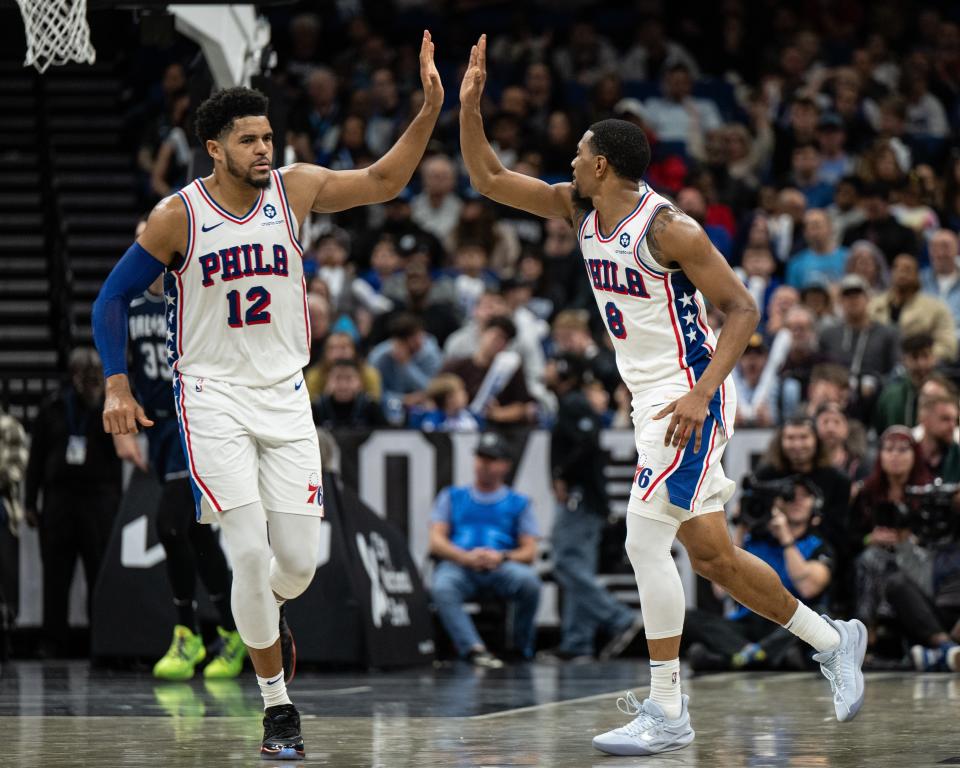
Good though they are, the Sixers need a little more to compete with the Celtics. And the urgency amongst the fanbase for change reflects that.
As things stand, the 76ers have one of the league’s highest payrolls, and even though nearly $100 million of that salary is expiring through the contracts of Tobias Harris, Marcus Morris, Nic Batum, Robert Covington, De’Anthony Melton and Furkan Korkmaz alone, the tax threshold has been a problem before. From 2024-25 onwards, the 76ers have only Joel Embiid, Jaden Springer and Paul Reed under contract, freed from the clamping effect that Harris’s contract has had for so long – it is precisely because nearly all of their salary is expiring that the time to strike is now. $100 million in expiring salary does not mean $100 million to spend in free agency, but it can mean $110 million returned in trade.
Fans will be hoping, entirely justifiably, for a trade for a Zach LaVine type, to set their stool out and fire back at the acquisitions of Porzingis and Holiday by their main rival. Notwithstanding the slightly disjointed nature of their draft capital, the possibility certainly exists if the financial backing does. But if all that comes to pass is a salary-dumping of Korkmaz into another team’s trade exception to save on some 2023-24 luxury tax, there may be mutiny.
Toronto Raptors
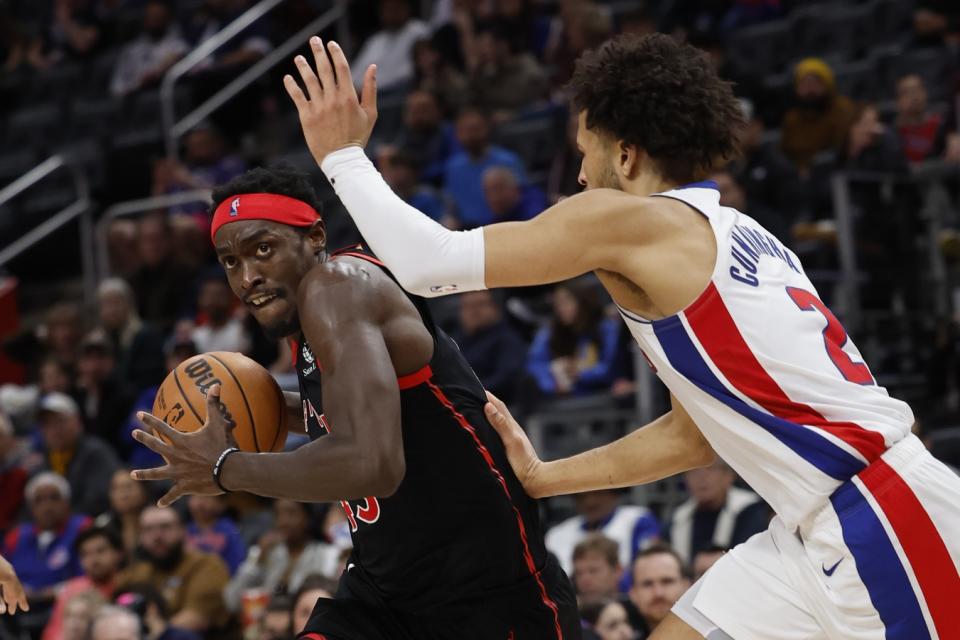
Pascal Siakam has been a target in trade around the NBA for so long now that it is a surprise only that it has not happened yet. Of the top-level impactful players widely considered to be available on the trade market right now, he might well be the best.
Masai Ujiri clung to the core of his 2019 title-winning team for as long as he could, but with Fred VanVleet departing over the summer and OG Anunoby being moved on last month, the incentive to keep Siakam has now largely gone. As good as he is, he is also a few months away from 30, and his peak is not going to be in time with Toronto’s next peak. It is best to cash in now, and so expect a Siakam trade to be a near certainty at this deadline, with almost every team interested.
To facilitate any such deals, the Raptors have a good spread of mid-size contracts (always very useful in constructing trade scenarios), of which $14.3 million is expiring in the form of the veteran forward duo Thaddeus Young and Otto Porter. The Raptors might also seek to get what they can for veterans Chris Boucher and Dennis Schroeder if they are indeed fully moving on, and a resolution must be found with Gary Trent Jr, whose $18.56 million contract expires this summer.
Trent is in a down year, particularly defensively, yet as a premium shooter aged only 24, he may be the ideal target for reloading-not-rebuilding teams looking for an in-season rejuvenation. It is perhaps best for the Raptors to understand that this time, they are the ones that should be providing that rejuvenation for others, rather than seeking it.
Washington Wizards
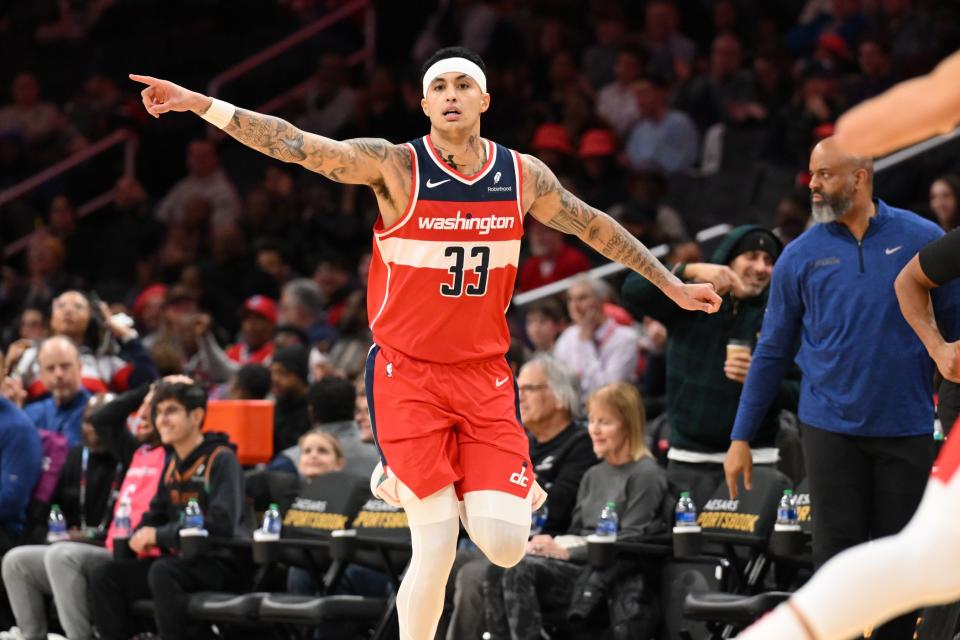
Like the Pistons above, the Wizards are so far adrift of adequacy that their overall direction in the market is automatic. At this point, they may as well lean into the lottery and sell whatever they can.
An obvious trade candidate is Kyle Kuzma, who has all the attributes a contending team will want. He is in the prime of his career, aged 28 and into his seventh NBA season, and is playing the best basketball of his career, averaging 22.4 points, 6.2 rebounds and 4.2 assists in 38 games so far this year, with the points and assists being career highs. Furthermore, he is relatively cheap for this level of production in only the first year of a four-year, $90 million contract, and he is going to get cheaper, having signed a contract that declines across its duration, an unusual move that will potentially offer a greater return on investment down the road.
Beyond moving Kuzma – and, if they can, Jordan Poole, who is doing his best but ultimately is on the wrong timeline for whatever the next incarnation of a competitive Washington team looks like – the Wizards might struggle to get other deals over the line. Perpetually solid starting point guard Tyus Jones will have suitors as both a player and a $14 million expiring contract, but veteran guard Delon Wright is more of a buyout candidate than a trade one, and Landry Shamet’s eight-figure contract is not supported by his seven-figure play (although the unguaranteed nature of his future seasons might make him more useful on the market).
To that end, the Wizards have sold where they can, having made a trade already with fellow basement dwellers Detroit that turned the expiring contracts of surplus veterans Danilo Gallinari and Mike Muscala into the hopefully-redeemable Marvin Bagley III and Isaiah Livers, along with two second-round picks. If they can make other such trades with Jones, Wright et al – perhaps dealing with Orlando above in deals centered around Markelle Fultz and the Denver Nuggets’ 2025 first-round pick – and work the margins to squeeze out decent assets and utilizing their freedom under the luxury tax, they should. The priority, though, is Kuzma.

